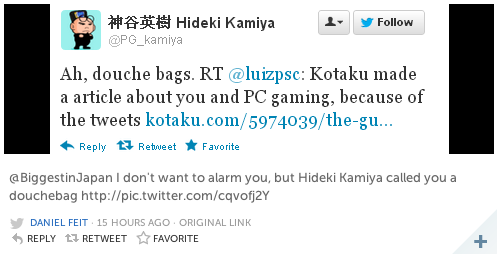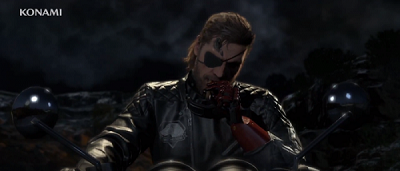

One thing that has happened since video games were created is that the culture "in-charge" of hardware development has changed a few times. This always creates a few problems within video gaming. In the 70s and early 80s, the Americans were there controlling everything about hardware and the software that ran on it and the problems it caused the Japanese were very evident in the lawsuits regarding the GCC developed Crazy Otto (later known as Ms. Pac Man) or Donkey Kong.
Sadly, the video game market reached a saturation point and quickly lost favor with most of America in the mid-1980s. We will never know what would have come next from American game makers. Instead, Japanese game makers stepped in and figured out a way to control the number and type of games that could be played on their hardware (the birth of DRM). Since that time, the console has always been key to the Japanese video game market.
Knowing this, I was surprised at the outcry when someone asked Hideki Kamiya what he thought about the Steam console. Hideki Kamiya is the maker of Resident Evil 2, Bayonetta, Viewtiful Joe, etc could be referred to more recently as the Bertolt Brecht of the video game makers on twitter. I didn't think it could end well. He replied by saying:

At this point, let's consider a word that is very important to the American mode of living. This concept is typically disguised as a, "well this is how it should be done" sentiment and it is incredibly difficult to consider given that it is a reason for our dominance in world markets while simultaneously being a reason for the rest of the world to be disgusted with us. We (Americans) don't discuss it. In fact, discussing it only occurs when something terrible happens. While there are various facets of this that have myriad of connotations behind it, the base for all of them come from the term ethnocentrism:

Why does this matter? Well, the most common response to Kamiya's tweet can be summed up using another tweet:

In America, thanks (in part) to Japanese hardware dominance after the early 80s and through most of the 90s, American video game makers developed a vast network of computer gaming. Because we (we being Americans) had control of the hardware and software on these systems, PC Gaming has been a dominant force as the price of PCs fell and gave way to the rise of the internet. In America, PC Gaming is champion (the Xbox 360 could be considered a bridge between these two disparate entities but abysmal sales in Japan show us that Japanese gamers do not feel the same way).
It is somewhat understandable that this is mostly a culture clash and it came as no surprise when this article appeared on Kotaku:

At this point, American ethnocentrism was very evident. It isn't that this title is particularly wrong. In fact, it is an accurate statement to say that most Japanese developers don't know (or don't care) about PC Gaming. It was the addition of a value-ladden sentiment like "clueless" that really set this issue on fire (Kotaku has since changed the title though the original URL is still live).
It should be noted that this article isn't really about him being clueless insomuch that it is about the reasons why PC Gaming isn't dominant in Japan (and how Japanese consumers distrust digital distribution of media). However, the article's title is all that is really needed to let Japanese developers know about how American game players felt about them. I don't know if this is more evident than in Kamiya's response to the article:

followed by this tweet the next day.

If this were an American developer, things would be very different. The game players or at least the people who read Kotaku would be up in arms about this asshole of a developer who would dare challenge their bastion of video game journalism. However, thanks to our sensitivity and absolute discomfort when something happens involving the clash of cultures, the only response seems to be to ignore or support this game maker no matter their actual "rightness" or "wrongness." Imagine if this was a female game developer from an english speaking country and you get a much different picture as well.
Video games are in some sort of cultural limbo at the moment. The shrinking world combined with a need to preserve culture combined with another need to reach as wide an audience as possible is creating a culture clash. Universally appealing games (in the United States) is an ethnocentrically charged statement because our own purchasing history are a near antithesis to many Japanese game makers.
It may be that Kamiya is just an angry guy and i'm sure that many people may write off this particular clash as, "just another day on the internet" or even, "another reason the Japanese are weird." However, as we find new ways to communicate with each other, it is more and more important to understand what makes us unique and that uniqueness needs to be embraced.



